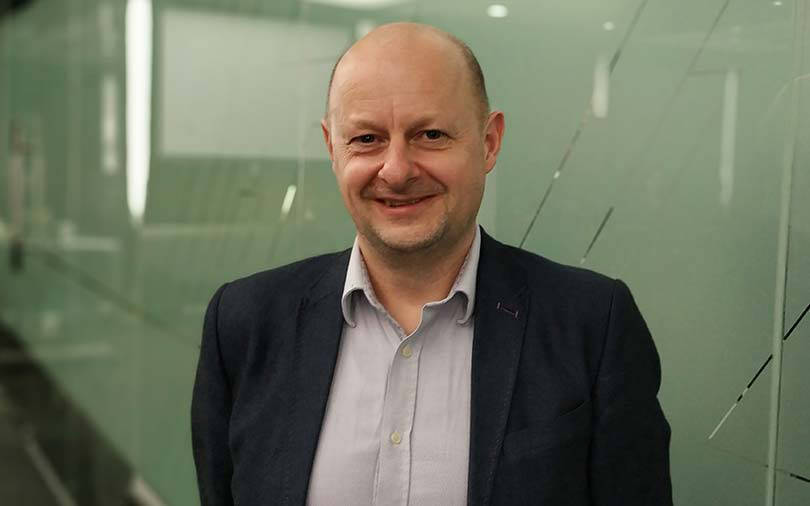
India is a hotbed for IoT innovations: ARM’s Chris Porthouse


SoftBank-backed ARM Holdings, whose chip architecture powers most smartphones around the world, is reinventing itself as a platform that provides data analytics and artificial intelligence for the trillion-odd connected devices projected globally by 2023. The British chip design company has developed an operating system ground-up for IoT devices as part of its transformation from a hardware developer to services.
In an interview with TechCircle, Chris Porthouse, ARM’s vice president and general manager for device services, spoke about the huge opportunity that IoT offers and how the company is gradually making efforts to accelerate the pace of IoT adoption. Edited excerpts:
IoT as a division was not big within ARM a few years ago. What is your mandate? Do you consider a smartwatch or a smart-glass to be an IoT device?

So, we are more focused on industrial IoT like smart cities, utilities, smart homes and connected spaces. We are focused on those enterprise customers. One of the things we are trying to accelerate... we are talking about a trillion connected devices by 2035. It is hard to envision what that would look like. How do we enable our partners and our customers to get to market and make IoT a reality? It is a huge challenge technically and commercially.
We are beginning to see people moving from proof-of-concept to production now. We see that in smart lighting, utilities, South Korean utility company KEPCO has ordered 20 million smart metres in the country. Transport and logistics is an important vertical for us. For instance, measuring the temperature or humidity and the data on this is becoming more valuable.
When do you see monetisation accelerating?

We are beginning to see companies start doing this on a small scale. From hundreds of IoT devices, now we are into the millions. So some companies are beginning to deploy at scale. We will see that shift in the next two years.
ARM’s DNA has historically been a product company. What kind of a shift is this for the company towards cloud, platform and services?
We are doing two things here. We are taking the best DNA of ARM, which is all about partnership. In the semiconductor space, no one company completely dominates the space. There is an ecosystem of silicon partners there around our chip architecture, which has accelerated the smartphone industry and our role was important in catalysing this change. We are taking those lessons for the services to be a horizontal cloud platform with multiple partners. We are not trying to build a vertical solution and dominate an industry.

We have also made some key acquisitions. Stream Technologies in the connectivity and device management space and Treasure Data in the data management space bring us the software services mentality. It is a good challenge and we will get this right. We have always embraced different ideas. We are an inquisitive company. These companies bring different ways of thinking and we can embrace that thinking.
Do you see India as an R&D hub playing a different role? Do you see ARM acquiring companies in India?
That is something SoftBank brought to us after they acquired us. They have a long term vision and also allow us to do our best as well as stupid things. ARM was always a bit cautious. But now we are making more investments and acquisitions. India has been a hotbed for innovations in the IoT space. There are some good partnerships that we are building in India. While we don't have anyone in India for our services team yet, we plan to expand the team into India on the software services side, which is a potential growth plan and we would like to take advantage of that.

Given the innumerable form factors involved, how challenging is building an operating system for IoT devices?
That is one of the reasons why our operating system is open source, allowing people to differentiate to bring their own functionality requirement. It is a platform operating system. The devices will have different connectivity options. Some might use bluetooth, some WiFi and some 4G or 5G. We provide a stack that can be fully productised. Another big challenge is security. Increasingly enterprise customers want a foolproof security for the data. If they can't protect the data of the device, it is considered worthless. The value is all about the data coming from these devices.
There are not many firms addressing the cybersecurity needs of IoT devices though there are for the platforms in general. Does your expertise in chip architecture help you build a better operating system or platform?

Yes, what we need is the platform security architecture, which is about building hardware and very low firmware with a basic level security to protect against particular threat models and we have done that working with partners by improving the architecture, guideline and compliance suite as well. Our operating system focuses on security support for various chip architectures so that developer does not need to worry about designing security. Security is built under the hood. We have 75,000 developers for Mbed OS and has been on millions of devices. That is a strong base anyone can build on.
Is the idea of platform-as-a-service becoming mainstream even for large enterprises because of the asset-light philosophy that everyone is embracing these days?
Customers want choice and don't want to be locked to a single provider. They want flexibility. Sometimes they want a private cloud of their own, which is an extension of the public cloud. The utility companies that we work with want an on-premise solution. The energy sector is the fastest adopter of these services, followed by transport and logistics and telcos as well.

